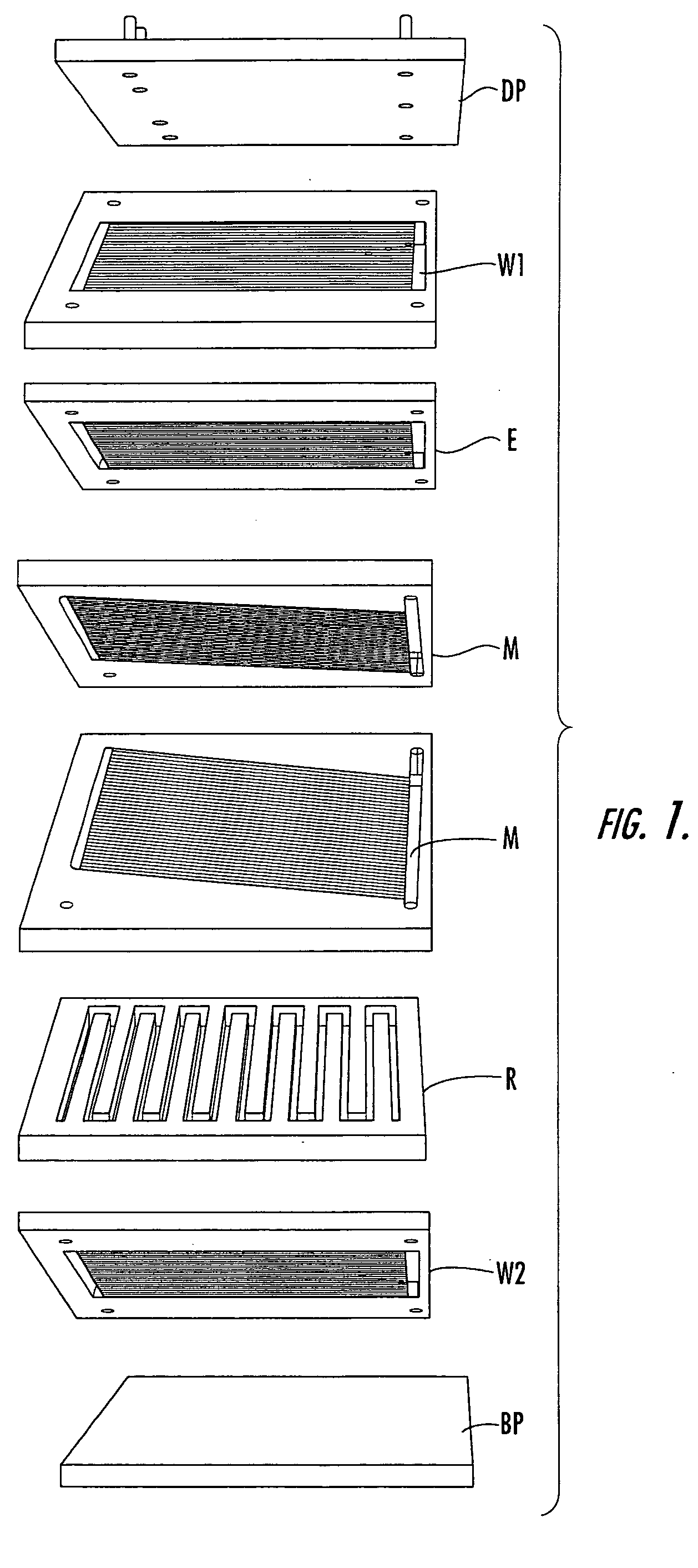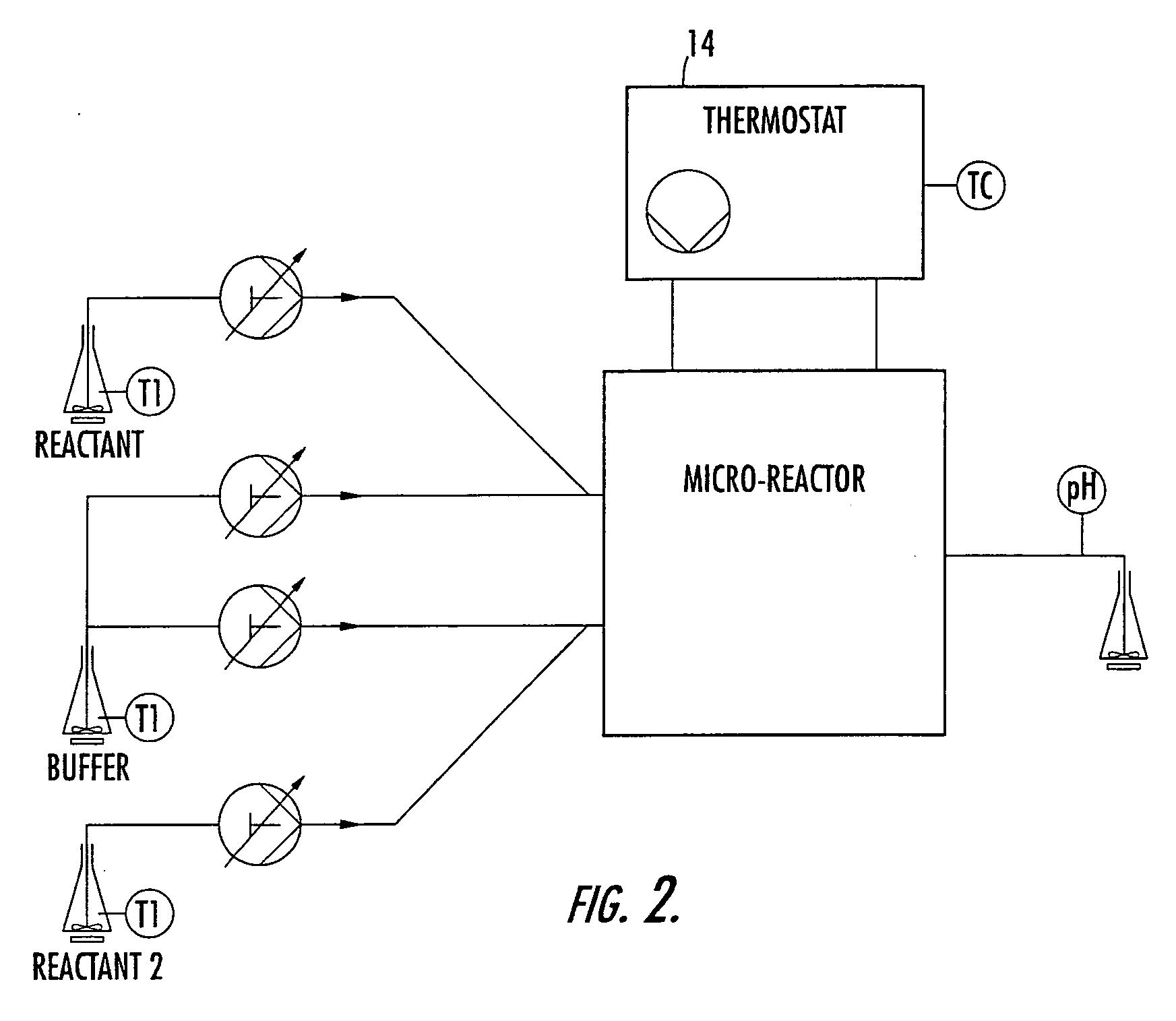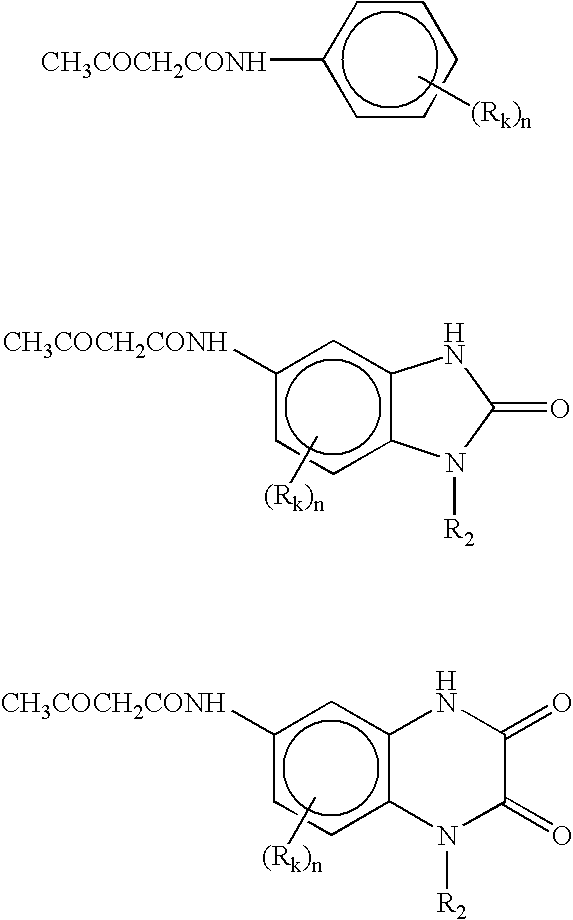Preparation of azo colorants in microreactors and their use in electrophotographic toners and developers, powder coatings, ink jet inks and electronic medias
a microreactor and colorant technology, applied in the field of azo colorants, can solve the problems of large dead space in equipment, scaleup of new products from laboratory scale to large,
- Summary
- Abstract
- Description
- Claims
- Application Information
AI Technical Summary
Benefits of technology
Problems solved by technology
Method used
Image
Examples
example 1
C.I. Pigment Red 2
[0094] Preparation of a Diazonium Salt Solution:
[0095] A 500 ml three-neck flask is charged with 14.6 g of solid 2,5-dichloroaniline in 25.1 ml of water, and 30.8 ml of 31% hydrochloric acid are added. The mixture is stirred at RT for 8 hours to provide a hydrochloride solution. On addition of a further 25.1 ml of water and 3.75 ml of 60% acetic acid the reaction mixture is cooled to −5° C. At this temperature, 11.5 ml of 40% sodium nitrite solution are added dropwise to the reaction mixture over about 15 min and stirred in at 0° C. for a further 60 min. The reaction mixture is clarified by adding six spatula tipfuls of Celite and rapidly filtering with suction. The yellowish diazonium salt solution is made up with water to a total volume of 300 ml (˜0.3 M).
[0096] Preparation of a Solution of the Coupling Component:
[0097] A second flask is charged with 23.9 g of Naphtol AS in 50.2 ml of water, and 26.7 ml of 25% aqueous sodium hydroxide solution are added. This...
example 2
Preparation of a Hydrochloride Solution of 2,5-dichloroaniline
[0100] A 500 ml three-neck flask is charged with 14.6 g of solid 2,5-dichloroaniline in 25.1 ml of water, 30.8 ml of 31% hydrochloric acid are added and the batch is stirred at room temperature for 8 hours. A further 25.1 ml of water and 3.75 ml of 60% acetic acid are added, and the solution is cooled to −5° C.
[0101] Solution of Naphtol AS
[0102] A flask is charged with 23.9 g of Naphtol AS in 50.2 ml of water, and 26.7 ml of 25% aqueous sodium hydroxide solution are added. This mixture is then stirred at 60° C. for 120 min to dissolve it. It is rapidly filtered with suction and likewise made up with water to a total volume of 300 ml (˜0.3 M).
[0103] Dilute Sodium Nitrite Solution
[0104] A 1N aqueous sodium nitrite solution is prepared.
[0105] Buffer Solution
[0106] A buffer solution is prepared from 4 ml of 60% acetic acid and 600 ml of water.
Diazotization of 2,5-dichloroaniline in Microreactor
[0107] The 2,5-dichloro...
example 3
C.I. Pigment Yellow 191
[0109] Preparation of a Suspension of 2B-Acid Hydrochloride
[0110] A 500 ml three-neck flask is charged with 46.2 g of solid 2B-acid (95.6%) (5-amino-3-chloro-2-methylbenzenesulfonic acid) in 400 ml of water, and 18.1 ml of 33% aqueous sodium hydroxide solution are added. The mixture is then heated to 90° C. After addition of 1.6 g of Celite and further stirring at 90° C., the batch is filtered hot. 92.8 ml of 20% hydrochloric acid are added to the filtrate to precipitate the amine hydrochloride.
[0111] Conventional Diazotization
[0112] The 2B-acid hydrochloride suspension is diazotized with 26.6 ml of 40% sodium nitrite solution at 20° C. Initially the nitrite is metered in rapidly, while the rest is added at such a rate that there is always a small detectable nitrite excess. The ready-produced diazonium salt suspension is adjusted with water to a total volume of 1 500 ml (about 0.13 molar).
[0113] Diazotization of 2B-Acid in Microreactor
[0114] The 2B-acid ...
PUM
| Property | Measurement | Unit |
|---|---|---|
| temperature | aaaaa | aaaaa |
| temperature | aaaaa | aaaaa |
| flow rates | aaaaa | aaaaa |
Abstract
Description
Claims
Application Information
 Login to View More
Login to View More - R&D
- Intellectual Property
- Life Sciences
- Materials
- Tech Scout
- Unparalleled Data Quality
- Higher Quality Content
- 60% Fewer Hallucinations
Browse by: Latest US Patents, China's latest patents, Technical Efficacy Thesaurus, Application Domain, Technology Topic, Popular Technical Reports.
© 2025 PatSnap. All rights reserved.Legal|Privacy policy|Modern Slavery Act Transparency Statement|Sitemap|About US| Contact US: help@patsnap.com



